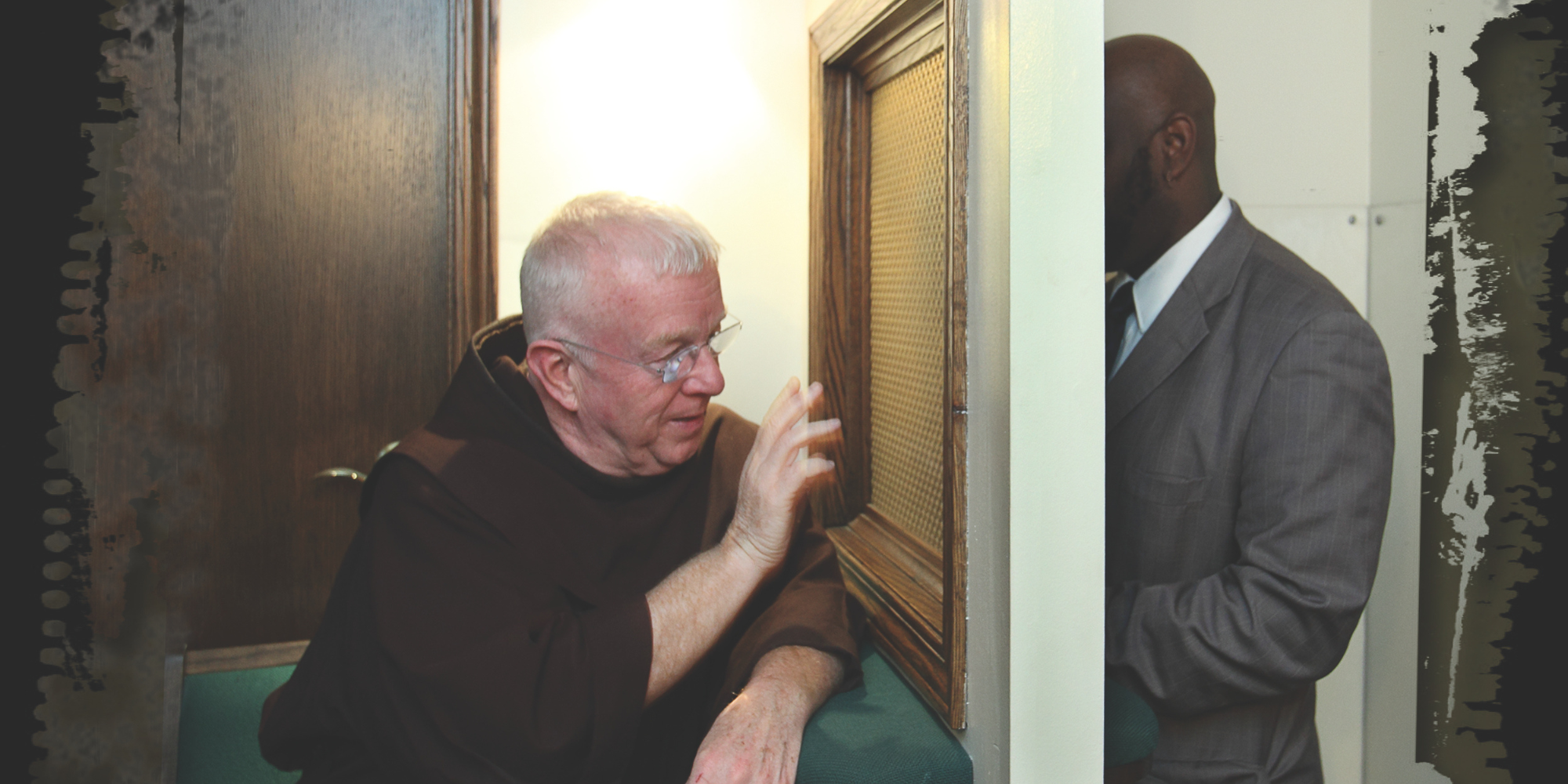Preparing for confession: Advice from 5 friars
Author: Eli Pacheco
Date Published: November 25, 2025
The joy of God’s grace is never far.
The Sacrament of Penance is God’s gift to all baptized Catholics. Through confession, we are freed from our sins and also encouraged to look upon those who may sin against us with compassion and mercy.
Penance might feel like an intimidating sacrament for many. It need not be. Below, five friars share suggestions for how to approach confession.
Why confess our sins?
When we confess our sins, we seek forgiveness and repentance, and commit to letting go of old habits or patterns that might have caused sin. In turn, the Lord welcomes us to joyfully receive him free from serious sin with an open heart.
The number of Catholics going to confession is on the rise. According to a Catholic News Agency report, 42% of Catholics surveyed in 2024 said they go to confession at least yearly, and 16% at least monthly, up 6% at least once a month, from a 2022 survey.
Receiving the grace of forgiveness encourages us to forgive others. As it says in the Prayer of St. Francis: “It is in pardoning that we are pardoned.”
How to prepare for confession
1. Examine your conscience
Before you step into the confessional, take some time to prepare through prayer and reflection.
Br. Bill Farris, OFM, invites those seeking the sacrament to reflect on their behaviors and relationships with others.
“Having a starting point is important if it helps a person to explore where our sins reside,” Br. Bill said. “It is easy to consult a list of standard sins, select those that apply and then convey them to the priest.”
Confession should be more than that. Br. Bill says the Sacrament of Reconciliation heals hearts, the complex and mysterious centers of our being. “Whatever list we use must help us wend our way deeper into that mystery,” he said.
Try this
Br. Bill suggests daily reflection at bedtime to review the day and enrich your self-understanding first.
“Instead of recalling in one session a week, a month, or years-worth of sins, we can bring together in our heart what we need to speak about with the priest,” he said. “It helps us identify action and inaction that mark our drift away from God and our brothers and sisters.”
2. Ask God to give you grace
Confession helps us to grow closer to Jesus Christ, Our Loving Savior. As you prepare for confession, ask God to give you grace so that you may grow ever closer to Him.
As a pastor, Br. Joseph Hund, OFM, frequently reminded penitents of the humility confession requires.
“It is a temptation to delay or deny the need for the sacrament,” he said. “Having the courage to overcome that temptation and the benefits of peace are a great gift.”
Try this
Before your confession, pray to God for help. Lay out your conflicts and hopes. Have faith that God hears you and trust in His will for you.
3. Confessional or face-to-face?
Br. Michael Haney, OFM, says confessing one’s sins face-to-face can enhance one’s experience of the sacrament and strengthen the community life of the Church.
“I appreciate our opportunity for interpersonal connection,” he said. “When we text message and leave voicemails, we do not see each other. Confession is an important sacrament. I prefer face-to-face.”
Br. Michael says he understands people’s apprehension but fears of a priest sharing a confession with others or judging the confessor are unfounded.
“Every sacrament has within it the grace of God that is working our lives," he said. "Confession is a way of infusing trust in God. We can feel bad about our sins, but God still loves us.”
Try this
Ask your confessor for guidance. He can help you address your anxieties and fears regarding the sacrament.
4. Give a prayer of thanksgiving and do your penance
After you confess your sins, the priest will propose an act of penance: a prayer, an act of charity, or a work of mercy.
Br. Tony Posadas, OFM, says prayers of thanksgiving and gratitude are essential to the Sacrament of Reconciliation and reminds us that confession should end with a grateful spirit in the presence of a loving God.
“Otherwise, someone's image of God can become one of a cruel God that has set us up to fail,” he said.
Try this
Listen to your confessor's advice and consider making it part of your prayer life. Br. Tony suggests that people realize their penance as soon as possible.
5. Decide how often to return
The Catholic Church requires that every Catholic go to confession at least once a year and encourages frequent confession to invite people to grow closer to God.
Br. Bob Hutmacher, OFM, has been a confessor for over 45 years. He says that there is no magic number for how often someone should go to confession.
“Some people need reminders of many things in their spiritual development,” he said. “Some who are scrupulous need the rule of ‘mortal sin necessitates the Sacrament of Penance.’
“You can encourage others to go when they need inspiration or celebrate God’s forgiveness in their hearts,” he continued. “People seem to know when to confess and ritualize God’s tender, limitless forgiveness.”
Try this
Do not seek a magic number. Consider the benefits of frequent confession: Developing humility and self-awareness, curbing unhealthy habits and avoiding spiritual neglect.

